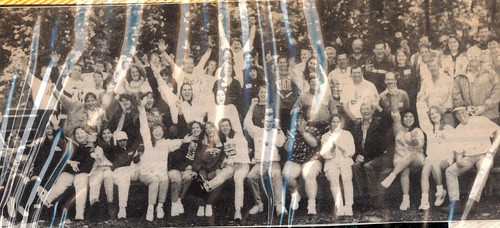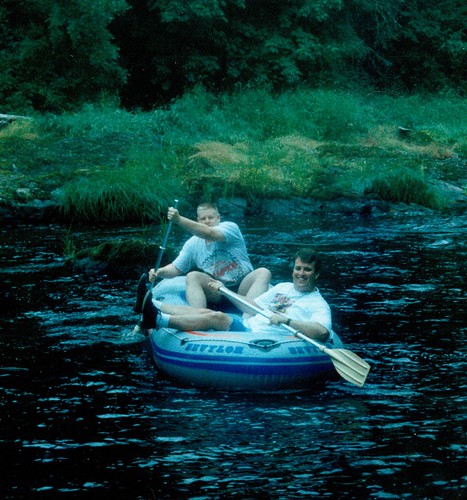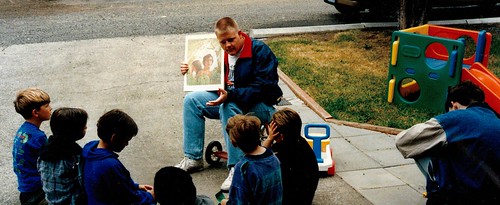This is missions week on my blog. This is part two of the story of my missionary summer. Part one can be found here:
It was a hot day and already in the mid-70s when I left from Nashville early in the morning. And it was 45° when I landed in Portland in the mid-afternoon. As you can imagine, I was immediately wondering how I was going to survive this "summer". I was certainly thinking that I did not pack enough clothes. (Before you worry, the first 10 days were cold and rainy, and the last 10 days were cold and rainy. The rest of the summer I may not have seen a cloud. It was cool and wonderful, the most beautiful weather you can imagine.)
Someone was at the airport with a cardboard sign with my name when I got off the plane. (This was back when non-passengers were allowed in the terminals.) As soon as I got my luggage I got out a jacket and prepared for an afternoon in the airport.

Over the next few hours, almost every missionary from the Northwest Baptist Convention arrived. We had a 2 day orientation at a lodge in the mountains. Day 2 included a sight seeing trip at the Columbia gorge.
At the end of day two we split up and the groups went their separate ways all over Washington, Oregon, and the Idaho panhandle. My association had four missionaries. Two girls, whose names I cannot remember (actually now that I think about it, their names might be Michelle and Karen) were in one group. They spent nearly the entire summer in the same ministry location. The other group was David Joiner and myself. We spent the vast majority of the summer in Longview and Kelso WA.
So what did a typical week consist of? On Sunday we would go to our host church. Most were in Longview/Kelso, but we spent a week in Scappoose OR and a week in Castle Rock. On Sunday the host church would usually want to hear from the missionaries. So I would give my testimony, and David would sing. By the end of the summer, David could easily have given my testimony for me, and I certainly had his songs memorized. Then, throughout the week we would hold some sort of Bible study for community children. I believe in 8 weeks we did 13 backyard Bible clubs, 2 Vacation Bible Schools, and a youth Bible study. Most weeks there were morning and afternoon Bible clubs/VBS, sometimes there was an evening event. Some weeks we worked with two or more churches.
Saturdays were typically travel days. The Pacific Northwest is a beautiful place, however, and many times rather than rest and do laundry, we would go with host families on sight-seeing trips. We took a few trips to the Columbia gorge, Castle Rock, and Mt. Saint Helens. We went to Seattle, where, as a kid from small-town KY, I saw things I'll never forget. We also went to Mt. Rainier on a very cloudy day, where we had a snowball fight in July.

Two weeks were exceptions. The week of the 4th of July no church wanted to have Bible clubs or a VBS, so we mostly had the week off. Our host pastor, Mike Neal, took care of us that week, we floated down the Coweeman River, (It even had a few rapids) and did typical Independence Day activities. It was a good time, mid-summer, for a restful week. We even had a cookout and saw fireworks on Lake Sacajawea.
The final week was the other exception. The convention had a week of children's camp at a place called the Dunes Bible Camp. It was on the beach, but the water was about 50° so there was no swimming. The four missionaries from our association plus a mission team from Mississippi, were the staff for this week. We served as basically the teachers for the entire camp.
So what did I learn from my experience as a Summer missionary?

Before leaving for this trip I had never taught a Bible study lesson. (Except on youth Sunday as a teenager.) I had only once spoken in front of a church. By the end of the summer, I was a veteran. I will never forget how nervous I was teaching the first Bible study to a group of Children, how great it felt as they paid attention, and some kind words of encouragement from one of the parents after I finished.
I can remember having a conversation with David during our last assignment. I was looking back and wondering if I accomplished anything. Over a 10 week summer, we saw no professions of faith, and no one was called to the ministry or to missions. We didn't build anything or accomplish some great task. Really I was rather depressed thinking that the summer had been wasted in some way. Although I knew I had been faithful to God.
However 2 summers later, as I was serving as the interim Minister of Youth at my home church, God called me into the ministry, and I could look back and see how much of what I now knew I could do, I learned in that summer. I definitely learned to rely on God. When you go 2500 miles from home, for a salary of $60 a week, to a place where they don't sell Mello Yello, without knowing a single person, before cell phones were common, you must depend on God for your support. You learn that you actually can depend on God. In fact, the main thing I learned that summer was that I can depend on God. He is always faithful.

Looking back, there are few experiences in my life that played as large a part in shaping who I am, as that summer. There is nothing like a mission trip to teach you things about God that you simply cannot learn at home. I would recommend summer missions to every college student, especially if you are struggling with God's will for your life.
You can learn about summer missions in North America at this link, and international summer missions at this link.












 There are a host of reasons why I can say to you that the LMCO is important. But I will only say this, the "All nations" part of the great commission I believe can best be reached cooperatively. If you are not a misisonary then what better way to spread the gospel to those who are unreached than giving funds to the International Mission Board.
There are a host of reasons why I can say to you that the LMCO is important. But I will only say this, the "All nations" part of the great commission I believe can best be reached cooperatively. If you are not a misisonary then what better way to spread the gospel to those who are unreached than giving funds to the International Mission Board. I have made no secret on this blog that
I have made no secret on this blog that  I am probably only giving about 5 Christmas gifts this year, so Lottie doesn’t have a lot of competition. I am, however, giving Lottie the largest gift I ever have. It’s no great amount but every little bit helps.
I am probably only giving about 5 Christmas gifts this year, so Lottie doesn’t have a lot of competition. I am, however, giving Lottie the largest gift I ever have. It’s no great amount but every little bit helps. I obviously am a blogger, but I don’t have a wide reading. I probably never will. Even so, I don’t feel disenfranchised. In fact I feel very welcome within my convention. It’s even possible that because I’m one of the 15% of non-grey-hairs at the convention that my voice gets heard a little more.
I obviously am a blogger, but I don’t have a wide reading. I probably never will. Even so, I don’t feel disenfranchised. In fact I feel very welcome within my convention. It’s even possible that because I’m one of the 15% of non-grey-hairs at the convention that my voice gets heard a little more.



 Monday night at the 2008 BSCNC featured a commissioning service for 31 IMB missionaries. It began with march in the flags of many countries lined the aisle ways as the missionaries worked their way on stage. Then it concluded with a message from
Monday night at the 2008 BSCNC featured a commissioning service for 31 IMB missionaries. It began with march in the flags of many countries lined the aisle ways as the missionaries worked their way on stage. Then it concluded with a message from